Russian volunteers have started a year-long simulated space mission, SIRIUS-23, at Moscow's IBMP, studying the effects of extended isolation. The all-Russian-speaking crew, led by Oleg Orlov, includes a cosmonaut, a psychologist, an operator/journalist, an engineer/pilot, and a doctor/surgeon, well-prepared for mission challenges.

Beginning Year-Long Simulated Mission
Six Russian volunteers have commenced a year-long simulated space mission under the SIRIUS project, as reported by Interesting Engineering. The team is dedicated to studying the impacts of extended isolation on human health and performance.
The SIRIUS-23 crew entered their simulated spacecraft on November 14 at Moscow's Institute for Bio-Medical Problems (IBMP), where they will endure 360 days of living and working in a confined environment. With a 60-year history, IBMP is a renowned research institute specializing in experiments related to human space exploration.
Designed to replicate the conditions of a deep space journey, the mission will involve a lunar flyby, multiple moon landings, orbital maneuvers, and rover operations on the lunar surface. Throughout the simulation, the crew will encounter technical and psychological challenges, including equipment malfunctions, communication delays, and interpersonal conflicts.
Diversed Crew
Marking a historic milestone in IBMP isolation experiments, an all-Russian-speaking crew, consisting of four women and two men, has taken center stage. The crew comprises accomplished individuals, led by Oleg Orlov, who not only serves as the commander but also holds the role of a physician.
Anna Kikina, a cosmonaut, assumes the position of the flight engineer. Daria Zhidova brings her expertise as a researcher and psychologist, while Yevgenia Ilyinskaya contributes as an operator and journalist. Alexander Suvorov holds the role of the engineer and pilot, while Maxim Khabarov serves as the doctor and surgeon.
With this diverse range of expertise, as on its official press release, the SIRIUS-23 crew stands well-prepared to navigate any challenges that may unfold during the course of their mission.
Also Read : Roscosmos Space Station Unveiled Before Its ISS Departure; Here's What You Need To Know About ROS
Collaborating for numerous years on isolation research, the SIRIUS project stands as a joint endeavor between the IBMP and NASA's human research program. Notably, while NASA has been an integral part of isolation research initiatives, it is not actively participating in the SIRIUS-23 mission.
This decision stems from budget constraints and competing priorities within NASA. Despite this, NASA remains engaged in other Earth-based analogs like CHAPEA and HERA. Additionally, the agency continues to explore both domestic and international opportunities aligned with its research objectives for future human spaceflight missions.
The SIRIUS project unfolds in four progressive stages, each characterized by an increase in duration and complexity. Commencing with the 17-day SIRIUS-17 in 2017, followed by the 120-day SIRIUS-19 in 2019, and the 240-day SIRIUS-21 in 2021, the project culminates in its fourth and final stage, SIRIUS-23.
Space reported that this stage is the most extensive and challenging, spanning a remarkable 360 days in 2023. The SIRIUS-23 mission represents an unparalleled opportunity for space exploration, offering a platform to gather crucial information for upcoming missions.
Related Article : Russia's Luna-25 Moon Mission Ends in Failure, Crashes on Lunar Surface

![Apple Watch Series 10 [GPS 42mm]](https://d.techtimes.com/en/full/453899/apple-watch-series-10-gps-42mm.jpg?w=184&h=103&f=9fb3c2ea2db928c663d1d2eadbcb3e52)



